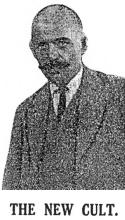
NEW LIFE CULT.
"The Master" On His Forest School.
by E. C. Bowyer
[Number 4 of 4]
[The last of four articles by journalist E. C. Bowyer, the Daily News (London) Feb. 19, 1923, pp. 1, 3. Bowyer quotes extensively from an interview with Orage, who introduces Gurdjieff's distinction between essence and personality to explain why people are dissatisfied with ordinary life.]
"ESSENCE."
The True Source of Love.
From Our Special Correspondent, E. C. Bowyer.
FONTAINEBLEAU, Sunday.
IF I tried to picture to myself the effect produced on the mind of the reader by my description of this remarkable colony at Fontainebleau, brought together by a common desire to realise an ideal of perfected consciousness and living, I should judge that he would be saying that it is all picturesque and interesting to a point, but that not enough has been told him of the teaching of the Prophet who may be called its spring of inspiration.
I had desired from the first to talk to M. Gurdjieff himself, but after three days it was only at midnight on Thursday that I was able to see him, and then under circumstances, already described, which gave no opportunity for what I wanted.
In the very early hours of this Sunday morning, after his work with his pupils in the
Study-House was over, he invited me to his room at the Priory, and talked to me at length.
Why Dissatisfied?
Even so, I cannot report an interview, for M. Gurdjieff insisted that what I might write should be the outcome of my conversations with two members of his immediate surroundings to whom he later recommended me.
Since I had been coming here the question had been forcing itself upon me as to what it was in the experience of all these people which had made them dissatisfied with normal life and the normal type, of which they themselves presumably had been examples.
I remember that I once put the question to Mr. Orage, and this is what he replied:
"There are men in London who are already as 'clever' as it is possible for men to be under ordinary conditions and who are asking themselves whether this is the ultima
thule—whether they have reached the final limits of their evolution."
"Something More."
"We believe that there is something more, and so we are here."
I repeated my question now. What is it that is wrong in ordinary life, and what is it that M. Gurdjieff desires to correct?
"First of all," came the reply, "it is necessary to distinguish between 'essence' due to heredity and 'personality' which accrues as the result of environment, education, and such causes.
Undeveloped "Essence."
"Every man is aware of the deficiencies in his undeveloped 'essence', but because he cannot realise that everybody else is in like case he shows a bold front to the world, and leaves behind his 'personality', which is not himself at all.
"At the present time the West does not sufficiently discern the differences between these two characteristics of men, and makes no efforts at all to educate the 'essence.' Hence, in the adult, 'personality' is fully grown, while the 'essence' remains infantile, and it is this disproportion that we think is the first place to correct."
"For example?" I asked.
Where Love Springs From.
"Love springs from 'essence' and not 'personality.' It may be that a child will not love its parents while showing affection for other people.
That we can correct, not with force or in any artificial way, but really so that the child will love them in the deepest meaning of the word.
Indeed, we educate children on new methods so as to develop the two principles side by side, but from the outset forming a complete individual.
The adult 'essence' is educated and brought up to the level arrived at already by the 'personality.' When this is achieved the two can work together, and it is then that actual progress towards the attainment of wisdom commences, and the harmoniously developed man takes the place of a one-sided, distorted entity."
The Institute claims very high powers for members who have become so 'harmonised,' and I was assured that among its present instructors are men who are proficient at any and every trade and handicraft, starting from the simplest and proceeding to the highest type of 'work'—sculpture, painting, philosophy, and the sciences.
"Has the ideal of such harmony ever been attained?" I asked.
"Yes, many times," was the answer; "but not many times in Europe. The men who have realised it belong almost entirely to the East, and it is still true that the West has an entirely erroneous conception of progress in Eastern lands.
This is the result of using only mechanical and material standards. It is only by deliberate self-training that harmony is attained."
Not All Immortal.
"Immortality," he added, "is not necessarily a blessing bestowed on everybody.
If a man has a soul, then he lives forever, but not every man is born with a soul. He may acquire one during life on earth, if he so desires, and will submit to the necessary training.
But it is quite possible to live happily and to die without possessing a soul. Relatively few men and women enjoy that luxury."
